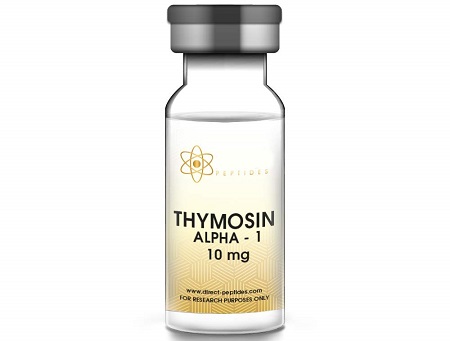Thymosin Alpha 1: A Powerhouse Immune Enhancer In The Battle Against Viral Infections Including SARS-CoV-2 Infections
COVID-19 News - Thymosin Alpha 1 Apr 18, 2023 2 years, 9 months, 3 weeks, 4 days, 23 hours, 16 minutes ago
COVID-19 News: Thymosin α1 (Tα1) is a small but mighty immunostimulatory peptide that has been making waves in the field of viral infectious diseases. It has emerged as a powerful immune enhancer in the fight against formidable foes such as hepatitis B, hepatitis C, and AIDS. This miraculous peptide has the ability to influence the functions of various immune cells, like T cells, B cells, macrophages, and natural killer cells, by interacting with an array of Toll-like receptors (TLRs). With its profound impact on immune cell function, Tα1 has been the center of numerous clinical applications and pharmacological research.

However, a comprehensive analysis of its clinical efficacy in these viral infectious diseases via its modulation of immune function has been elusive, until now.
Researchers from Zhejiang Chinese Medical University-China and the University of Macau in a new study review suggest that Thymosin α1 is also a prospective antiviral agent for treating COVID-19.
The thymus, a crucial component of the immune system and a primary lymphoid organ, is responsible for producing a vast array of immunocompetent T lymphocytes. It plays a critical role in the differentiation of CD8+ T cells, CD4+ T cells, Treg cells, and natural killer (NK) cells, which are essential in mounting effective immune defenses against a wide range of viral pathogens while maintaining immune system homeostasis.
Tα1, a peptide hormone produced by thymic stromal cells, plays an essential role in T cell differentiation, development, and maturation. This highly conserved peptide is found in multiple mammalian organs, such as the thymus, spleen, lung, kidney, brain, and blood, with the highest concentration in the thymus.
Its synthetic derivative, thymalfasin, has been integrated into various clinical products and is now approved in over 35 countries for the treatment of hepatitis B and C, as well as immune-regulating effects in a variety of other disorders. Tα1 has been used to treat a wide range of illnesses, including acquired immune deficiency syndrome (AIDS), pseudomonas, and mold toxicity, and sepsis.
Most recently, Tα1 has been employed in the treatment of severely ill patients with coronavirus disease 2019 (COVID-19) as reported in certain studies and also
COVID-19 News coverages.
https://pubmed.ncbi.nlm.nih.gov/33271780/
https://www.frontiersin.org/articles/10.3389/fimmu.2021.673693/full
https://www.ncbi.nlm.nih.gov/pmc/articles/PMC9754924/
https://www.ncbi.nlm.nih.gov/pmc/articles/PMC7409727/
Tα1's efficacy in treating viral infectious diseases, particularly SARS-CoV-2 infection, has been hot
ly debated. To establish a solid foundation for its clinical use for the treatment of viral infections, the study team conducted a systematic review of relevant studies from PubMed (Medline), Scopus, and Web of Science databases.
This comprehensive analysis offers a detailed overview of Tα1's characteristics, immunomodulatory properties, molecular mechanisms underlying its therapeutic effects, and its clinical applications in antiviral therapy.
One of the most significant applications of Tα1 is in the treatment of COVID-19. The emergence of SARS-CoV-2 and its associated disease, COVID-19, in 2019 led to a global public health crisis of unprecedented magnitude. As of April 13, 2023, the virus had infected over 762 million people worldwide, resulting in over 6.8 million deaths.
Early research has linked elevated blood levels of pro-inflammatory cytokines to lung inflammation and damage in SARS patients. Similarly, patients with COVID-19 have been found to have high levels of inflammatory cytokines, resulting in an exaggerated inflammatory response.
Tα1 is often used as an immunopotentiator in clinical applications for viral infections.
Recent studies have shown that Tα1 therapy reduces the RNA shedding time in COVID-19 patients and improves viral clearance rates.
https://www.frontiersin.org/articles/10.3389/fmed.2021.664776/full
In vitro studies and clinical studies have demonstrated that Tα1 treatment helps alleviate lymphopenia in patients with COVID-19 and can promote the proliferation and differentiation of effector T cells.
https://www.nature.com/articles/s41422-020-0391-9
https://www.frontiersin.org/articles/10.3389/fmed.2021.664776/full
https://pubmed.ncbi.nlm.nih.gov/34149679/
Additionally, Tα1 has been shown to modulate cytokine production, reducing the levels of pro-inflammatory cytokines and increasing the production of anti-inflammatory cytokines. These effects help mitigate the cytokine storm, a major cause of acute respiratory distress syndrome (ARDS) and multi-organ dysfunction in COVID-19 patients.
https://pubmed.ncbi.nlm.nih.gov/33506065/
https://pubmed.ncbi.nlm.nih.gov/34149679/
The precise molecular mechanisms underlying Tα1's immunomodulatory effects are still under investigation. However, several studies have highlighted its ability to interact with various Toll-like receptors (TLRs) expressed on immune cells. TLRs play a crucial role in recognizing viral pathogens and initiating immune responses. Tα1 has been found to increase TLR expression and promote downstream signaling pathways, leading to enhanced antiviral responses.
Moreover, Tα1 has been shown to improve the functionality of immune cells, including T cells, B cells, macrophages, and natural killer (NK) cells, which play a critical role in mounting an effective defense against viral infections. By enhancing immune cell function, Tα1 bolsters the body's natural defenses, allowing it to better combat viral infections.
Clinical trials have demonstrated Tα1's effectiveness in treating various viral infections, such as hepatitis B and C, AIDS, and COVID-19. These studies have shown that Tα1 treatment leads to reduced viral load, improved clinical symptoms, and reduced risk of complications. The safety profile of Tα1 has also been well established, with few reported side effects, making it a promising therapeutic agent for viral infectious diseases.
In conclusion, Tα1's ability to modulate immune function and enhance the body's natural defenses against viral infections makes it a powerful weapon in the fight against viral infectious diseases. The extensive research on its clinical applications and molecular mechanisms has paved the way for its integration into antiviral therapy. While further investigation into its precise mode of action and potential synergistic effects with other antiviral treatments is necessary, Tα1 holds great promise as a potent immune enhancer in the battle against viral infections, including the ongoing COVID-19 pandemic.
The study review findings were published in the peer reviewed journal: Molecules.
https://www.mdpi.com/1420-3049/28/8/3539#B71-molecules-28-03539
For the latest
COVID-19 News, keep on logging to
